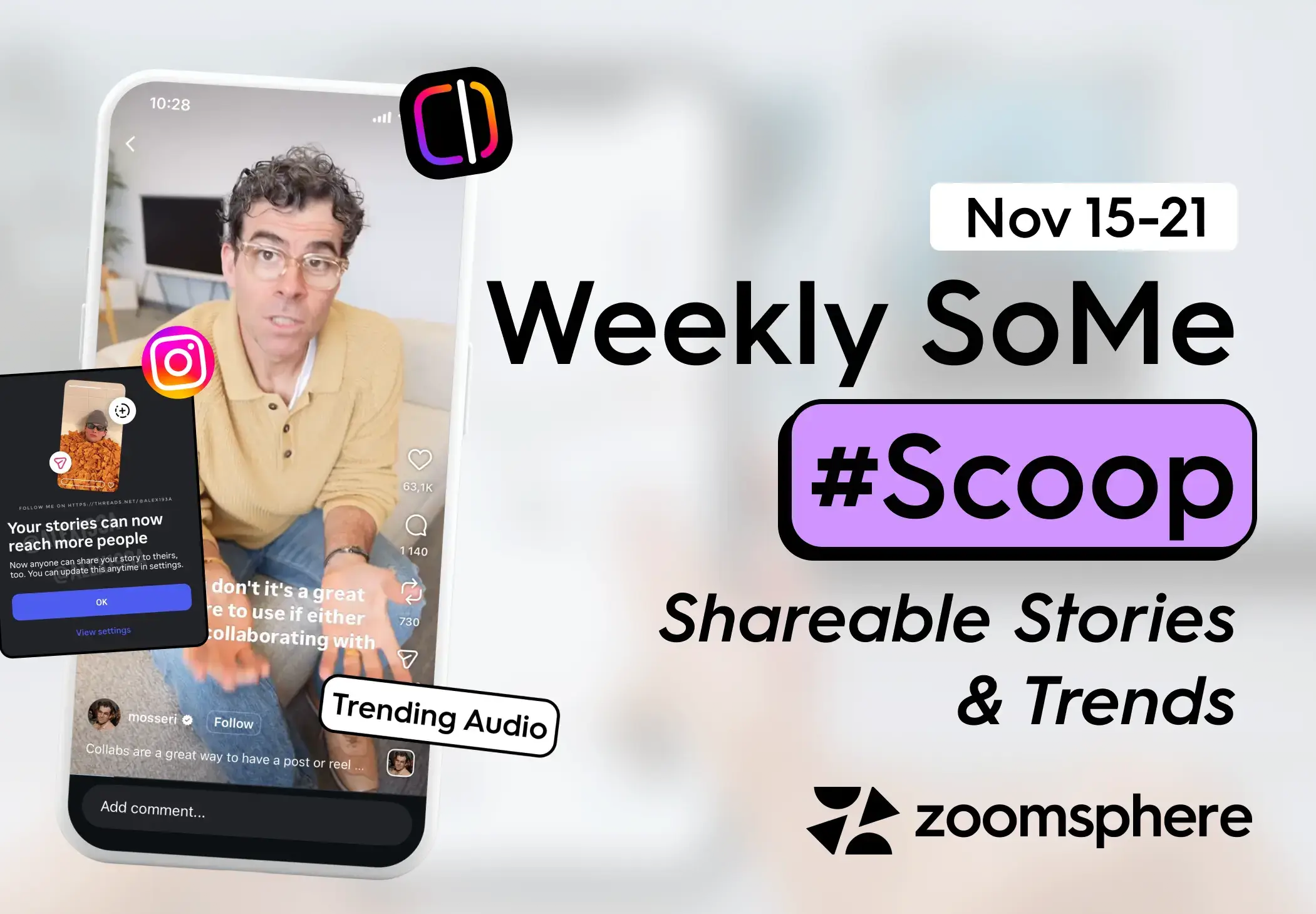How Much Social Media Content Collaboration Is Too Much?

Social media content collaboration sounds noble—like a team of digital wizards huddling to shape genius. But here’s the sour truth: half the time, you’re not collaborating. You’re stalling.
If you're editing a caption for the fourth time because someone’s cat didn’t “vibe” with the tone, you’re not creating—you’re campaigning for consensus. And that’s not work. It’s well-dressed delay.
Harvard found that managers now burn up to 85% of their week in meetings, feedback chains, and decision whack-a-mole. Social media teams are basically professional context switchers.
Now, this isn’t about being too collaborative. It’s about mistaking activity for output—and bleeding your strategy dry in the process.
Let’s fix that.
When Everyone Has Input… and Nothing Gets Out
You nod, everyone nods. Thirteen hours, 17 red-line comments, four fragmented Slack threads later… the post is still “under review.” Meanwhile, TikTok’s algorithm has changed three times, and your competitor just ran the exact same idea.
This isn’t teamwork—it’s a treadmill. Social media content collaboration isn’t only about getting stuff done—it’s about preserving the myth of consensus. And somewhere in there, your social media team turned into well-meaning roadblocks.
%20(1).webp)
The “Feedback Sinkhole”
What starts as helpful input quickly becomes a swamp. Content approval turns into content paralysis. Designers tweak visuals, copywriters pivot tone, managers nitpick hashtags—until nobody remembers what the post was supposed to do. And suddenly, your campaign’s heat is just… lukewarm.
Over-collaboration is the disease. You’ve stacked your team like Russian nesting dolls—each layer says “yes,” but no one delivers. And all you end up with is a swollen, friendly email thread—and zero clicks.
Enough is enough. You don’t need fewer people—you need better processes. One clear path from draft to publish. Defined windows for feedback. A deadline that doesn’t bend because someone’s cat didn’t vibe with the emoji.
That’s what collaboration tools for social media untangle. They give your team guardrails—not micromanagement. They let you keep your brand voice sharp, not muffled by seven rounds of feedback. They let you approve, not stall.
Let’s stop hiding behind rounds of input and start asking one real question: How can we collaborate smarter, not harder? Because right now, “team effort” feels like a polite way to say “collective stall.”
It’s not about silencing voices. It’s about giving the right voices the stage—and shutting the door on the rest. Keep the flow, lose the drag. And yes, it’s totally possible.
{{cta-component}}
Why Your Workflow Isn’t Flowing (And What’s Gumming It Up)
Too Many Hands. Not Enough Heads.
Your “workflow” isn’t flowing. It’s limping.
If your content planning involves four tools, three spreadsheets, a “🔥final-final-DONE🔥” Slack channel, and a Google Doc sitting somewhere in Susan’s inbox from three Thursdays ago, you don’t have a social media workflow. You have a scavenger hunt disguised as collaboration.
And the more people you involve, the less anything actually moves. It’s mathematical decay. Research shows that influence drops off entirely after three degrees of separation. Put more than five people in your workflow, and what you’re calling “alignment” is just cosplay.
Instead of progress, you get this awkward politeness loop. No one wants to step on toes. No one wants to be the person who says, “We’re done.” So everyone adds just a little more feedback. Just one more tweak. Just one more “maybe this instead?”
A proper social media workflow shouldn’t just list tasks. It declares decision points. It limits voices to the ones that actually need to weigh in. And yes, it defines the damn deadline.
Because once you know who is doing what by when, you don’t need seven meetings and a committee of anxious yes-men to publish a post about your next webinar.
The fix isn’t complicated. You need to move the work to where it belongs—into structured, functional tools that act like execution machines. Not feedback museums.
Your team deserves to create, not orbit around stalled threads and emotional ping-pong. Start by naming the problem: it’s not the people. It’s the weight of a broken system pretending to be collaboration. Let it go. Let the process lead.
Because the next time someone says, “Can we add one more thing?”—you should be able to say, “No. We’re already done.” And mean it.
%20(1).webp)
99% of Your Audience Doesn’t Care. Why Are You Rewriting That Caption Again?
If a post falls in the algorithm and no one likes it… did it really need seven rounds of approval and that minor existential crisis?
The 1–9–90 rule says that 1% of your audience creates content, 9% might interact, and 90% just lurk. That means 99% of your audience won’t comment, won’t share, and won’t care if that sentence you tweaked seven times ends in a period or an em dash.
This is math. Your social media collaboration process has to earn its keep. If the team’s energy is going into microscopic refinements for a ghost audience, you're not collaborating. You’re quietly bleeding.
Now this doesn’t mean quality doesn’t matter. It just means the moment you confuse polish with impact, you lose sight of the actual job: to communicate, not dazzle your internal reviewers.
And it gets worse. The more feedback loops you entertain, the more the original message softens. Voice dilution happens. Momentum dies. The content calendar becomes a graveyard of “almost-ready” ideas—because perfection became the approval standard.
Look: that same caption your team rewrote four times? The 1% who create won’t see it. The 9% who might care are already moving on. And the 90% were never really watching.
It’s not your team’s fault. It’s the system you’re using. When every comment has equal weight and no one is empowered to hit publish, the only thing that moves is the deadline. This is what happens when the act of collaboration becomes a social performance—not a productive rhythm.
Your content calendar should never be a shrine to what could’ve been. It should be a machine. A functional, timely rhythm that gets content out while it’s still relevant. You can’t out-schedule irrelevance, and you definitely can’t out-approve it.
Your team deserves a system that respects their time and protects their output from endless soft edits and vague “thoughts.” Something that treats social media collaboration like the business function it is—not an emotional playground for indecision.
Because if your caption still hasn’t gone live and you’re still discussing whether “Check this out” sounds too casual, the problem isn’t the copy. It’s your process. And it’s robbing your team of their actual work—getting seen.
{{form-component}}
Fatigue Isn’t Just for Users—It’s Eating Your Team Alive
Your designer sighs. Your copywriter opens the same doc for the fifth time. Your client drops in another emoji-laced “tweak.” What you’re calling collaboration has crossed into its final form: fatigue.
Let’s call it what it is—performance drag. Not in the glamorous way. This is the slow bleed of attention, initiative, and sanity that creeps in when your social media team spends more time juggling feedback than producing anything meaningful.
And it’s not just internal.
Recent research confirms that up to 93% of users suffer social media fatigue due to oversaturation, constant platform demands, and algorithmic turbulence. You’re feeding content into a black hole of burnout—for them and for you.
So here’s what no one likes to admit: the more pressure you put on the team to keep up, the faster they stop caring. And when no one on your side of the table has the energy to care, you’re not a marketing department anymore. You’re just a digital loop. Publish. Wait. Burn out. Repeat.
That endless cycle is not just bad strategy—it’s bad for morale. And yes, bad for business.
And the worst part is… you’ve normalized it. You've started to treat mental exhaustion like a minor inconvenience. You call it "just a busy week." But it’s the fourth one in a row. And still, somehow, that carousel still isn’t approved.
The fix isn’t pizza Fridays. It’s not scheduling fewer meetings. It’s rebuilding your structure around collaboration tools for social media (like ZoomSphere) that are designed for how people actually work when they’re stretched thin.
Tools that automate approvals, centralize feedback, and stop forcing your team to re-answer the same question across three different platforms.
Tools that enforce boundaries so your creative staff can spend less time reacting and more time producing.
Because burnout doesn’t just show up in time logs or passive-aggressive Slack replies. It shows up in flat ideas, missed moments, and “fine, whatever” approvals that tank campaigns before they even go live.
You don’t need a team that can do more. You need one that can do less—and actually finish it.
Otherwise, you’re not running a social team. You’re managing a digital support group. And nobody signed up for that.
Collaboration Isn’t the Enemy. Bad Collaboration Is.
Collaboration isn’t the problem. The way most teams do it is.
Social media content collaboration has become a polite way to describe digital micromanagement. One person posts an idea, three people want revisions, two more start a sub-thread about hashtags, and suddenly it’s next quarter. And no, your audience hasn’t been waiting breathlessly for your perfectly punctuated carousel.
It’s not that you have too many voices—it’s that nobody knows when to shut up, or when not to comment. That’s not collaboration. That’s corporate stalling dressed as teamwork.
And look: creative teams don’t need chaos to create. They need borders, not brainstorms on top of brainstorms. They need workflows with teeth. Deadlines that bite back. Approval processes that don’t read like a UN resolution.
%20(1).webp)
The difference between “we need to talk” and “this is done” is structure. And structure isn’t restrictive—it’s the only thing that lets your social media team breathe without bracing for feedback every three minutes.
The magic’s not in the people—it’s in the setup. Get the system right, and suddenly the same team that couldn’t finalize a caption can plan a whole content calendar without hemorrhaging willpower.












Heading 1
Heading 2
Heading 3
Heading 4
Heading 5
Heading 6
Lorem ipsum dolor sit amet, consectetur adipiscing elit, sed do eiusmod tempor incididunt ut labore et dolore magna aliqua. Ut enim ad minim veniam, quis nostrud exercitation ullamco laboris nisi ut aliquip ex ea commodo consequat. Duis aute irure dolor in reprehenderit in voluptate velit esse cillum dolore eu fugiat nulla pariatur.
Block quote
Ordered list

- Item 1
- Item 2
- Item 3
Unordered list
- Item A
- Item B
- Item C
Bold text
Emphasis
Superscript
Subscript



.webp)



%20(1).webp)
%20(1).webp)

